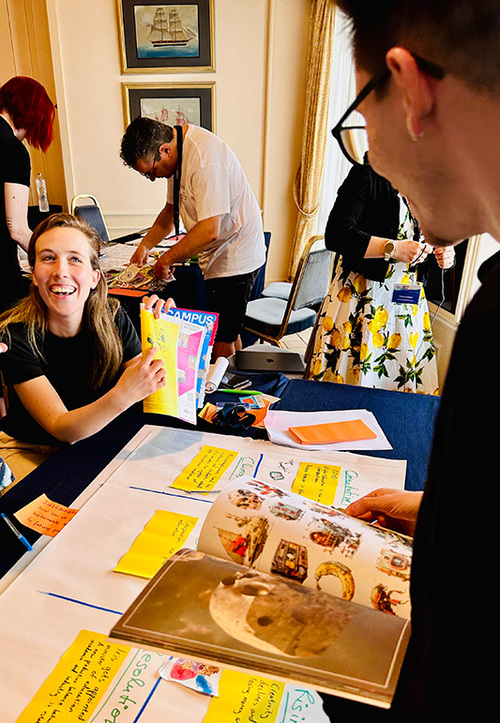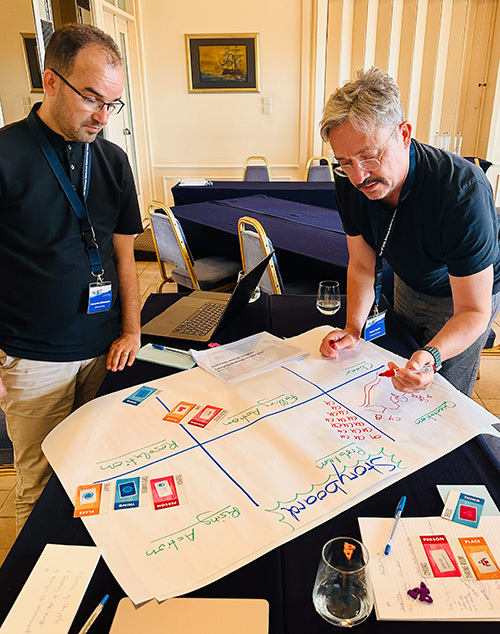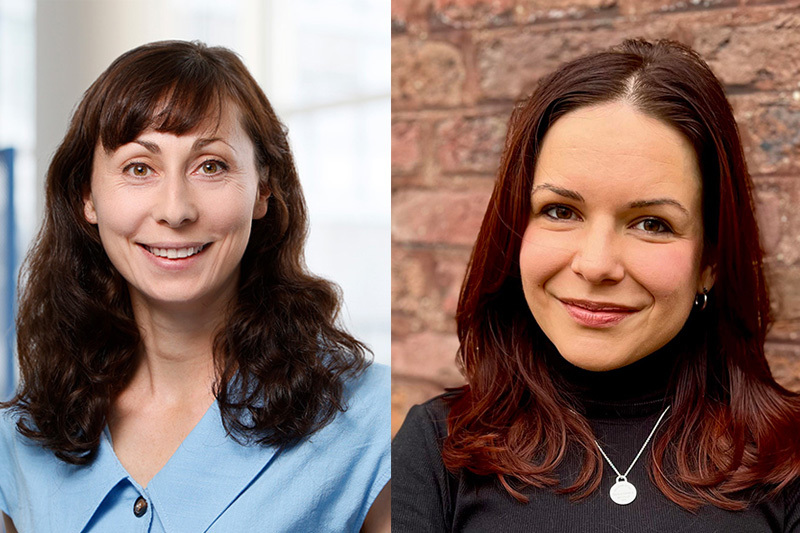News
A look at the future of education – an interview with the Learning Sciences team
[06.08.2025]Artificial intelligence is forcing us to rethink educational processes. At the same time, there are still major gaps in our research. Dr. Florence Lehnert and Daiana Rinja from the Learning Sciences research professorship team want to contribute to and help shape new findings in precisely this area of tension. In this interview, they venture a glimpse into the future with us.
 Photo: Privat
Photo: Privat
Since the beginning of this year, CATALPA has had a research professorship in Learning Science in Higher Education headed by Prof. Dr. Marcus Specht. Florence, you are a postdoctoral researcher and Daiana, you are a doctoral candidate who has been involved from the start. What are you working on in the field of learning sciences?
Florence Lehnert: I am looking at how education could be transformed in the age of AI. We use futurology, particularly design fiction, to gain a better understanding of the visions, fears, and hopes that different groups of stakeholders associate with AI and how these visions of the future are already influencing our thoughts and actions today. The central question is: How can we not only imagine the future of education, but also actively shape it?
Design Fiction
Design fiction is a speculative design practice that uses narrative elements and prototypical artifacts to create alternative future scenarios and open them up for discussion. Unlike design thinking, which focuses on user-centered solutions to today's problems, design fiction aims to explore possible futures in order to challenge existing assumptions and enable new perspectives on technology and society.
 Foto: Privat
Foto: PrivatI deliberately chose design fiction because this method is particularly well suited to making the complex interactions between AI and education visible, tangible, and discussable. In workshops with various stakeholders, we jointly develop speculative scenarios for a future educational landscape with AI, ranging from utopian to dystopian scenarios.
These then serve as spaces for reflection to explore opportunities, risks, and options for action in dealing with AI. At the JTEL Summer School, for example, we held a workshop with international early-career researchers. They developed storyboards that addressed key challenges in education—and the role of AI in them.
The scenarios ranged from liberated ancient teachers revealing the ultimate authority behind Moodle, to cybernetic fortresses as humanity's last refuge, to corporations treating students like employees. These fictional stories helped to make deeper questions tangible, such as: Who will shape education in the future, and what role will humans play in the learning process?
Further workshops will follow in the fall, in which students will co-create their own future scenarios with the support of AI and visualize them artistically.
Daiana Rinja: After I started, I first immersed myself in literature reviews and other empirical studies on the connection between AI and self-regulation. I wanted to get an idea of what we know so far. I am particularly interested in concepts such as meta-cognition, i.e., the ability to plan one's own learning and to address strengths and weaknesses in the learning process with problem solving, or help seeking, i.e., actively seeking help. Generative AI is no longer new, but the first studies on learning and the impact of AI on educational issues are just being published. We do not yet know exactly what long-term effects learning with AI will have on skills that are essential for learning. A key issue here is cognitive off-loading, i.e., the transfer of thinking tasks to external aids such as AI systems in order to reduce our mental load. The exciting question is: What happens when we increasingly delegate problem-solving skills to AI agents such as ChatGPT?
A good everyday example of this is navigation systems. They have undoubtedly increased our efficiency on the roads. We get to our destinations faster and with less stress. At the same time, studies show that this has impaired our ability to orient ourselves spatially because we have handed over this cognitive process to technology.
How did you come to your research interests and ultimately to CATALPA?
 Foto: Hardy Welsch/Privat
Foto: Hardy Welsch/PrivatFlorence Lehnert: Bevor ich zu CATALPA kam, war ich an der Universität Luxemburg in der Forschungsgruppe für Human-Computer Interaction tätig, wo ich promovierte und gemeinsam mit dem französischen Bildungsministerium an der Weiterentwicklung von E-Assessment-Systemen für Kinder gearbeitet habe. Fokus meiner Forschung war das Messen und Evaluieren des Nutzungserlebnisses von jungen Kindern, insbesondere im Vorschulalter. Es ging darum, geeignete Methoden zur UX-Evaluation bei Kindern zu finden.
Meinen psychologischen Hintergrund habe ich später durch eine Designperspektive im postgradualen Programm User-System Interaction an der Technischen Universität Eindhoven erweitert. Für mich ist die Verbindung aus Psychologie, Design und Technik mehr als ein methodisches Zusammenspiel, das sich aus meinem Werdegang ergeben hat. Sie ist der zentrale Leitgedanke, mit dem ich komplexe Bildungsfragen im digitalen Zeitalter angehe.
Daiana Rinja: Ich habe meinen Master in Educational Technology gemacht und war danach als Learning Experience Designerin tätig. Dort habe ich die Entwicklung des Curriculums geleitet und an der Schnittstelle zwischen Technik und Learning Sciences gearbeitet. Mich hat es aber irgendwann zurück zum Akademischen getrieben, weil ich mich tiefer mit Fragestellungen auseinandersetzen wollte, die in der Wirtschaft zu kurz kommen. Dann lief mir irgendwann die Stelle bei CATALPA über den Weg und passte genau in meinen Plan.
In die Zukunft geblickt: Wenn ihr euch einen praktischen Impact eurer Forschung und Erkenntnisse wünschen könntet, was wäre das?
Florence Lehnert: Mein Ziel ist es nicht nur, Räume für kritisches Zukunftsdenken zu denken, sondern sie konkret zu schaffen – und Bildungsakteur*innen darin zu bestärken, aktiv, reflektiert und partizipativ an der Gestaltung von Bildung im KI-Zeitalter mitzuwirken. Hierfür eröffnen beispielsweise die spekulativen Fiktionen Möglichkeitsräume und helfen dabei, Zukunftsbilder sichtbar, erfahrbar und diskutierbar zu machen.
Gleichzeitig wird meine Zukunftsforschung zunehmend durch das aktive Experimentieren mit neuen Technologien ergänzt. In einer gerade gestarteten internationalen Kollaboration werden wir den Einsatz immersiver Technologien wie Virtual und Augmented Reality im Bildungskontext erproben. Dabei interessieren uns sowohl didaktische als auch ethische Fragestellungen: Wie lassen sich immersive Umgebungen so gestalten, dass sie Lernende motivieren, herausfordern und einbinden? Welche Kompetenzen werden in solchen Settings gefördert, und welche möglicherweise unterdrückt? Welche Risiken gilt es zu beachten?
Durch diese Verbindung von kritischer Reflexion und experimenteller Praxis möchte ich dazu beitragen, dass technologische Entwicklungen nicht einfach über die Bildung hereinbrechen, sondern gemeinsam mit Bildungsakteur*innen gestaltet werden – menschenzentriert, verantwortungsvoll und mit Blick auf die Bildungszukunft von morgen.
Daiana Rinja: Ich möchte gerne an Design-Prinzipien für den Einsatz von KI-Agenten für Bildung mitwirken. Mir ist es vor allem wichtig, dass Studierende und Lehrende von neuen Technologien und dem Einsatz von KI profitieren und diese pädagogisch sinnvoll zum Einsatz kommen.

